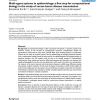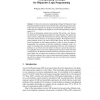703 search results - page 139 / 141 » A general framework for multidimensional adaptation |
ATAL
2010
Springer
13 years 8 months ago
2010
Springer
Multi-agent learning is a crucial method to control or find solutions for systems, in which more than one entity needs to be adaptive. In today's interconnected world, such s...
BMCBI
2008
13 years 7 months ago
2008
Background: Computational biology is often associated with genetic or genomic studies only. However, thanks to the increase of computational resources, computational models are ap...
BMCBI
2007
13 years 7 months ago
2007
Background: In practice many biological time series measurements, including gene microarrays, are conducted at time points that seem to be interesting in the biologist's opin...
BMCBI
2008
13 years 7 months ago
2008
Background: Prediction of transmembrane (TM) helices by statistical methods suffers from lack of sufficient training data. Current best methods use hundreds or even thousands of f...
AICOM
2006
13 years 7 months ago
2006
In this work we present a backjumping technique for Disjunctive Logic Programming (DLP) under the Answer Set Semantics. It builds upon related techniques that had originally been p...


